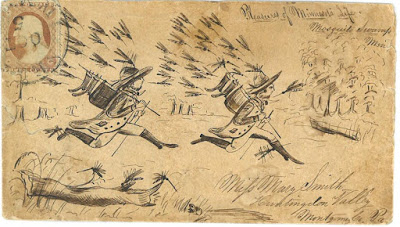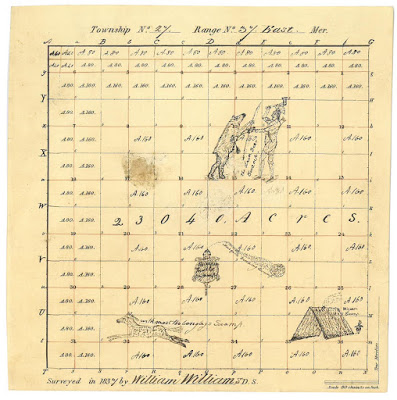Balmy summer weather has finally arrived in Ann Arbor, and the staff at the Clements Library are enjoying the season’s warmth and sunshine. The joys of sipping lemonade in the shade and lounging in hammocks are tempered by the less popular harbingers of summer– mosquitoes. Mosquito-borne illnesses continue to plague the modern world, with West Nile, Zika virus, malaria, and dengue fever still making news headlines. While the resources at our disposal to try to mitigate and prevent the spread of disease far outweigh those available in the eighteenth and nineteenth centuries, the annoyance we feel when confronted with a mosquito’s whine and bite seems remarkably unchanged from that expressed by our forebears.
Our Edward L. Buttrick Diary records Buttrick’s experiences as an itinerant schoolteacher in rural Kentucky in 1843. Buttrick remarked after a particularly restless hot September night, “The musquitoes nearly ate me alive. It was an excessively warm night & I could only cover my face in the bed clothes & be resigned to my fate… I could bear the biting but the singing was what troubled me. They sing you a song & then present their bills which you must receive in spite of all protestations.”
The familiarity of the mosquitoes’ “song” is referenced in this sheet music from 1899.
 |
| Howard Whitney, The Mosquitoes’ Parade: A Jersey Review (New York: M. Witmark and Sons, 1899). Versions of the song can be heard on YouTube. |
The Mosquitoes’ Parade draws on the shared understanding of the insect’s high-pitched and incessant drone to add humor and depth to the score. Laughing at the misfortune of dealing with the evasive and persistent mosquito also tends to be coupled with a good dose of hyperbole to express the sheer frustration caused by them. Take, for example, this illustrated envelope from our Pen and Ink Collection.
While the swarms of mosquitoes featured in this piece labelled “Pleasures of Minnesota Life” may be larger and more ferocious than those in real life, the exaggeration evokes the size of the artist’s despair in trying to outrun and outwit the pests in “Mosquito Swamp, Min.”
Another type of “mosquito swamp” appears in an illustrated survey map from our Samuel Williams Papers. Samuel Williams served as the chief clerk in the Northwest Territory surveyor general’s office, and this map may have been a light-hearted joint effort with his brother, William. Near the center of the survey, the “Musquito Breeding Swamp” would surely be a place to avoid.
This sampling from our collections hints at the long-standing irritation with these summertime pests. As Edward Fenno, of our Fenno-Hoffman Family Papers, lamented while suffering through a New Orleans summer in 1823, mosquitoes “are an obstacle to all improvement of the mind… one must be made of most impenetrable stuff to withstand their attacks.” Alternatively, we can sing the praises of the 21st century while using copious amounts of insect repellent.


